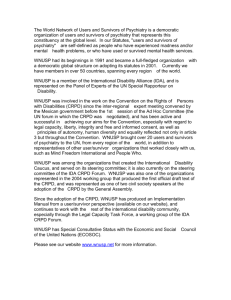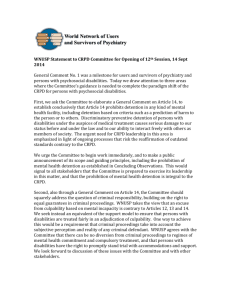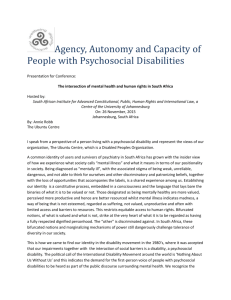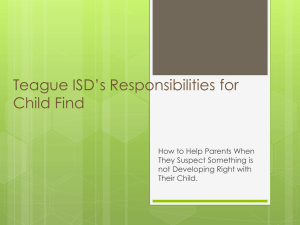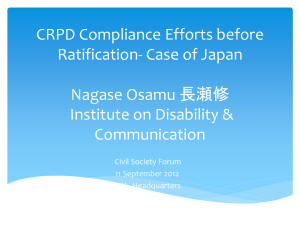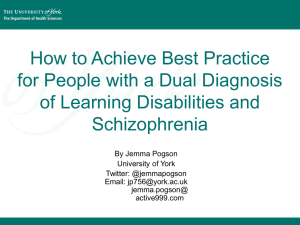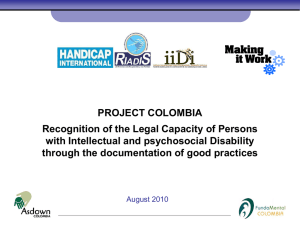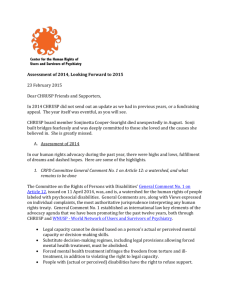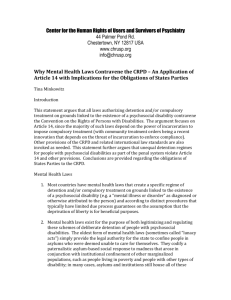Joint Submission to Committee on the Rights of Persons with
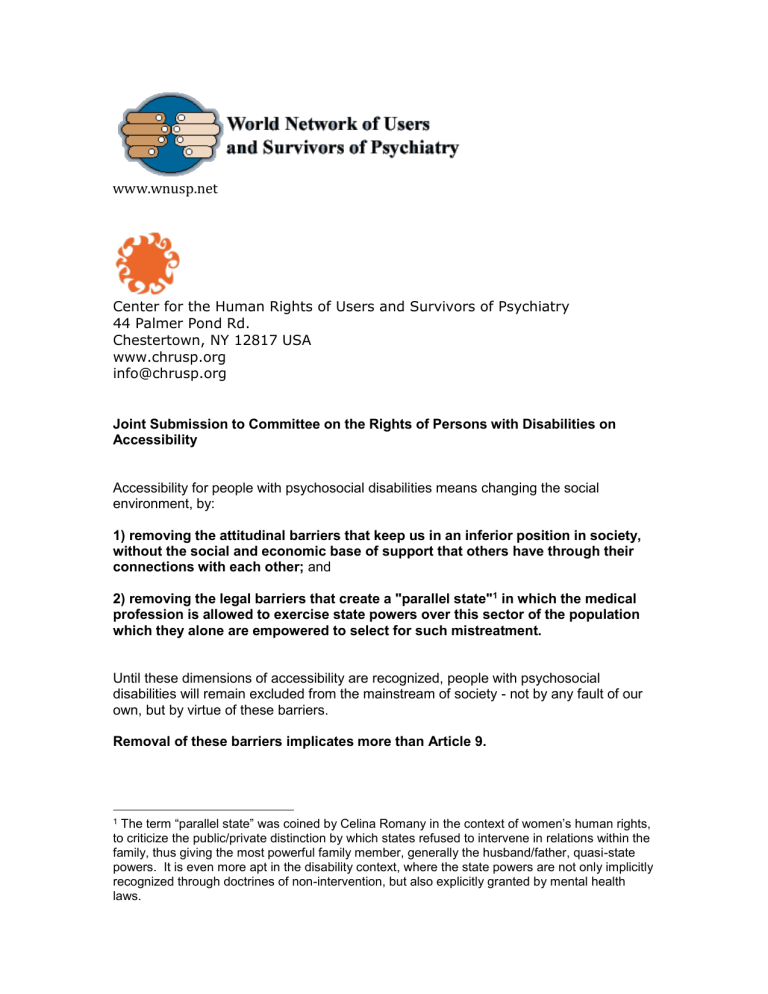
www.wnusp.net
Center for the Human Rights of Users and Survivors of Psychiatry
44 Palmer Pond Rd.
Chestertown, NY 12817 USA www.chrusp.org info@chrusp.org
Joint Submission to Committee on the Rights of Persons with Disabilities on
Accessibility
Accessibility for people with psychosocial disabilities means changing the social environment, by:
1) removing the attitudinal barriers that keep us in an inferior position in society, without the social and economic base of support that others have through their connections with each other; and
2) removing the legal barriers that create a "parallel state" 1 in which the medical profession is allowed to exercise state powers over this sector of the population which they alone are empowered to select for such mistreatment.
Until these dimensions of accessibility are recognized, people with psychosocial disabilities will remain excluded from the mainstream of society - not by any fault of our own, but by virtue of these barriers.
Removal of these barriers implicates more than Article 9.
1 The term “parallel state” was coined by Celina Romany in the context of women’s human rights, to criticize the public/private distinction by which states refused to intervene in relations within the family, thus giving the most powerful family member, generally the husband/father, quasi-state powers. It is even more apt in the disability context, where the state powers are not only implicitly recognized through doctrines of non-intervention, but also explicitly granted by mental health laws.
Legal barriers:
Any laws that explicitly discriminate against any sector of the people, and create a legally inferior status for that sector, are the starting point for an analysis of what needs to be done to remove barriers. Attitudinal barriers may have given rise to the legal barriers initially, but the legal barriers are more amenable to measurable change: either the law identified as creating an inferior status is still in force, or it is not. Changes in social attitudes are mutually dependent with legal change, and it is in recognition of this mutual dependence that Article 8 is placed into the CRPD. But Article 8 cannot stand alone, without devolving into a "feel-good" exercise for governments and the nondisabled population, that does not improve the situation of disabled people.
The Committee has called on States Parties particularly to dismantle their systems of substituted decision-making, to repeal the legal provisions allowing for deprivation of liberty based on psychosocial or intellectual disability, and to incorporate into the law abolition of treatment without free and informed consent of the person concerned.
(Concluding observations on the reports of Spain and Tunisia.) These measures, addressed under Articles 12, 14 and 17, together with repeal of any other discriminatory laws under Articles 4(b) and 5, would remove the inferior legal status of people with psychosocial disabilities, which constitutes the greatest barrier to improvement in our social and economic status and our enjoyment of barrier-free life among our fellow human beings.
* We urge the Committee to reiterate, in the context of accessibility and removal of barriers to the free participation in society by people with disabilities, its commitment to removal of laws that create an inferior legal status for people with psychosocial disabilities, particularly with respect to legal capacity and decisionmaking, liberty, and respect for physical and mental integrity including the right of the person concerned to give or refuse free and informed consent to medical treatments.
Additional areas of legal discrimination include the exemption of employers from wage regulations in the operation of sheltered workshops, removal of child custody from parents with psychosocial disabilities, and ineligibility of people with psychosocial disabilities to vote or to marry, as aspects of legal capacity.
In addition, removal of social and economic barriers needs to be addressed in the areas of work and entrepreneurship, adequate standard of living, equal access to health care, and political participation.
Health:
A study in the U.S. found that people with psychosocial disabilities are dying an average of 25 years earlier than the general population, and that this increased mortality is directly related to the dose and number of neuroleptic drugs a person had received. The numerous and devastating adverse effects caused by neuroleptics and other psychiatric drugs are commonly ignored by medical practitioners, who treat the complaints as further symptoms of "mental illness" to be suppressed by increasing the dose or adding another drug. It is also common for general complaints of physical ill-health to be misunderstood as psychiatric symptoms, particularly where the person is known to have
been given a psychiatric diagnosis in the past. A psychiatric diagnosis is disabling, since it creates a barrier to obtaining health care of the same quality as others
(Article 25). (This is only one way in which the diagnosis is disabling; obviously the legal exclusions discussed above, based on psychiatric diagnosis, are examples of disablement.)
Work and entrepreneurship:
People with psychosocial disabilities experience barriers to employment that have not been addressed successfully under anti-discrimination law. For example, many of us have gaps in our work history, and there is nothing prohibiting an employer from considering this negatively or from questioning us about the reason for such gaps. A truthful answer would require disclosure of the experience of disability when it is not our choice to so disclose. Whether or not the employer is enlightened enough to not consider such disclosure in a negative light, it means that we either have to lie, against our moral values, or give up the right to choose when, and for what purposes, to disclose our experiences of disability.
Access to work and entrepreneurship opportunities is also limited because our social connections are often diminished as part of the attitudinal barriers we face. A survivor recently commented to me that people in his community see his life in light of his earlier committal to a state psychiatric hospital.
From my observations, we also may have difficulty fitting in with the culture of an organization or workplace, because we tend to be more internally-directed and yet remain sensitive to conditions in our social environment.
Furthermore, sheltered workshops continue to operate in many countries under laws that exempt them from wage regulations (in violation of CRPD Article 27). Often employment programs designed for people with disabilities have a reputation of channeling people into low-wage, low-status employment despite the qualifications of the individual.
Removing barriers to social and economic advancement of people with psychosocial disabilities would require:
* Replacing the requirement of a work history that accounts for life in discrete periods of time, with more relevant ways of demonstrating qualifications.
* Creating an environment in which people are given the benefit of doubt.
* Actively raising awareness about human diversity and the range of human experience including intense emotional/spiritual states, trauma, and hearing voices/seeing visions, while combating judgmental labels including those from a medical perspective that pathologies these forms of experience.
* Cultivating an open mind towards unconventional approaches, and not rejecting them as unprofessional or irrelevant.
* Creating policies and habits of interaction that mutually explore differences to seek a way forward.
* Maintaining awareness of intersecting discrimination, including a gender perspective, in these processes.
* Abolishing laws and customs that exempt employers from fair labor practices towards persons with disabilities, including laws that allow the operation of sheltered workshops.
Adequate standard of living:
In countries without social insurance/social assistance to provide direct sustenance to people who have inadequate or no income to sustain themselves, people with psychosocial disabilities are dependent on families who are themselves struggling with basic needs and thus not able to provide meaningful attention or support. Families may also fear what they do not understand. Practices like chaining people in yards or confining them indoors, while other family members to go work or seek food and water, can only cause suffering and anguish, and maintains the person in conditions of desperation, which is likely to reinforce the decision to adopt such treatment towards the person.
Families also bring people into institutions where the treatment is similar, whether it is chaining or cage beds, straitjackets, four- or five-point restraints tying the person to a bed, or drugs used as chemical restraint to disable spontaneous initiative. Families often leave the person in the institution and abandon them.
In countries where there exist social insurance/social assistance schemes, including disability pensions, it is more possible to leave the institutions (subject to the will of medical professionals and courts operating under laws that contravene CRPD Article
14). However, they are often stuck in poverty and low-wage, low-status work, and may live in mental health housing, which is segregated housing tied to a mental health agency, which typically restricts a person's freedom with requirements to attend mental health programs during the day and to take medication. Rules on eligibility for disability pensions, free health care, and personal assistance, also keep people in poverty by setting very low limits on the amount of assets and income a person can acquire while maintaining eligibility.
Other barriers to enjoyment of a decent standard of living by people with disabilities include debts and other financial mishaps, absence of affordable housing, and systemic economic crisis and recession, which have a greater impact on those who may be estranged from their families and other sources of advice and assistance.
Ordinary social and economic resources, rather than specialist measures that remain within the medical model of disability, are needed to prevent and end institutionalization and to prevent and end abusive practices by families. Articles
28 and 19 need to be read in conjunction so as not to forget this. The first step is to provide the means by which people with psychosocial disabilities can enjoy a decent standard of living, during and after any period of distress, without needing to enter an institution or to access the mental health system in order to provide for their basic needs of housing, food, water, clothing and health care.
Political participation
Even in implementation of the CRPD, which calls for close consultation with persons with disabilities through their representative organizations (Article 4.3), users and survivors of psychiatry are not participating to the extent of our expertise and interest in making laws and policies related to our rights and concerns. The reasons appear to be both a persistent under-resourcing of our organizations (which creates a vicious cycle, as grants tend to be awarded to organizations commensurate with their existing budget
and track record), and “rhetorical disability” – the failure of mainstream society to accept people with psychosocial disabilities as valid human subjects. It is still common for family and ca rer organizations to be sought out as the spokespersons on “mental health” issues while our own movement is barely on the radar of the media, politicians, academia and civil society as a whole. Human rights and development NGOs have now joined the ranks o f “experts” on our issues while we ourselves are, at best, given one speaking slot in a conference.
Affirmative action is required by governments, funders and civil society (including human rights and development NGOs), who should seek out and give preference to experts who are users and survivors of psychiatry/people with psychosocial disabilities. Rather than trying to “build our capacity” to function in mainstream ways, the mainstream needs to adapt itself to our ways of functioning.
CRPD as a tool for inclusive development
In many countries, particularly in the absence of a functioning judiciary, development aid and poverty alleviation programs are the main site where progress can be made towards full accessibility and inclusion. It is therefore necessary for all actors involved in these programs to adhere to the CRPD fully and to embrace policy shifts that promote an accessible society for all sectors of people with disabilities.
The Committee might invite development-oriented agencies of the United Nations, other inter-governmental organizations and donors to engage in dialogue with the
Committee and with organizations of people with disabilities, regarding the implications of the CRPD for their work.
In conclusion, we thank the Committee for its continued interest in the perspectives of civil society and in particular the lived experience of persons with disabilities.
Accessibility obligations towards people with psychosocial disabilities may be more difficult to quantify as precise standards, than obligations towards other disability sectors. Though different in nature, standards can be derived from our lived experience and should be promoted alongside the others.
The Center for the Human Rights of Users and Survivors of Psychiatry (CHRUSP) provides strategic leadership in human rights advocacy, implementation and monitoring relevant to people experiencing madness, mental health problems or trauma.
In particular, CHRUSP works for full legal capacity for all, an end to forced drugging, forced electroshock and psychiatric incarceration, and for support that respects individual integrity and free will.
The World Network of Users and Survivors of Psychiatry is a democratic organization of users and survivors of psychiatry that represents this constituency at the global level. In our Statutes, "users and survivors of psychiatry" are self-defined as people who have experienced madness and/or mental health problems, or who have used or survived mental health services.
WNUSP had its beginnings in 1991 and became a full-fledged organization with a democratic global structure on adopting its statutes in 2001. Currently we have members in over 50 countries, spanning every region of the world.
WNUSP is a member of the International Disability Alliance (IDA), and is represented on the Panel of Experts of the UN Special Rapporteur on Disability.
WNUSP was involved in the work on the Convention on the Rights of Persons with
Disabilities (CRPD) since the inter-regional expert meeting convened by the Mexican government before the 1st session of the Ad Hoc Committee (the UN forum in which the
CRPD was negotiated), and has been active and successful in achieving our aims for the Convention, especially with regard to legal capacity, liberty, integrity and free and informed consent, as well as principles of autonomy, human diversity and equality reflected not only in article 3 but throughout the Convention. WNUSP brought over 20 users and survivors of psychiatry to the UN, from every region of the world, in addition to representatives of other user/survivor organizations that worked closely with us, such as
Mind Freedom International and People Who.
WNUSP was among the organizations that created the International
Disability Caucus, and served on its steering committee; it is also currently on the steering committee of the IDA CRPD Forum. WNUSP was also one of the organizations represented in the 2004 working group that produced the first official draft text of the
CRPD, and was represented as one of two civil society speakers at the adoption of the
CRPD by the General Assembly.
Since the adoption of the CRPD, WNUSP has produced an Implementation Manual from a user/survivor perspective (available on our website), and continues to work with the rest of the international disability community, especially through the Legal Capacity Task
Force, a working group of the IDA CRPD Forum.
WNUSP has Special Consultative Status with the Economic and Social
Council of the United Nations (ECOSOC).
Please see our website www.wnusp.net
for more information.
